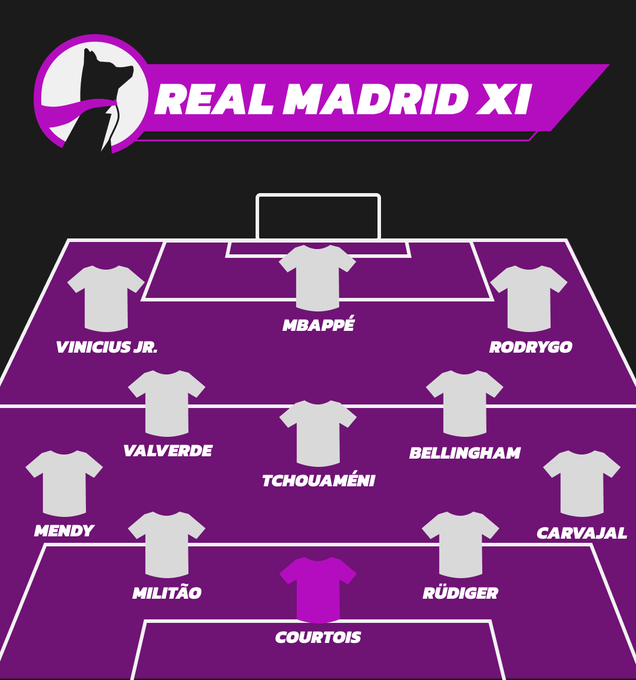As the final whistle blew at Wembley on Saturday at approximately 10PM local time, Real Madrid were crowned champions of Europe for the fifteenth time, winning the UEFA Champions League with a 2-0 victory over Borussia Dortmund. To put that number in perspective, the next-most successful club in the competition is AC Milan who have lifted the trophy seven times in their history.
No, this is not a case of winning many of these trophies before innovations in the sport, unlike the Montréal Canadiens in the NHL and the MLB’s New York Yankees, two franchises with a multitude of titles, albeit many of which (or, in Montréal’s case, all) were won before this millennium. Real Madrid have won the UCL six times in the past eleven years. First, it was Cristiano Ronaldo, Gareth Bale, and Karim Benzema leading the line for Los Blancos in the 2014 final. On Saturday, it was young Brazilian forwards Vinícius Júnior and Rodrygo, two brilliant young players flanking English superstar Jude Bellingham, the La Liga player of the season who will not even turn 21 until June 29th.
It has become expected that Real Madrid will win the Champions League each year—it seems to be more surprising when they are eliminated. It does not even seem to matter how well (or poorly) they play. Dortmund outplayed them for the majority of this year’s final. Two years ago, Liverpool dominated every statistic in France except the final score, so much so that Madrid’s goalkeeper won the Man of the Match award after making nine saves in a 1-0 victory. A month prior, Real Madrid were down two goals heading into the 89th minute of the second leg of the semifinals against Manchester City, but scored twice after that mark to equalize before advancing with an extra time goal. This year, a similar circumstance occurred in the semifinal matchup against Bayern Munich, where the German giants were ahead by a goal on aggregate before an 88th minute Joselu goal tied it up, and his second of the match won them the tie in the 91st minute.
There is something fundamentally ridiculous about Real Madrid’s performances in the Champions League. It almost seems like a sort of black magic, allowing them to play poorly for the majority of matches, yet remain within striking distance for last-ditch comebacks. The posts between which Thibaut Courtois and Andriy Lunin—Madrid’s two goalkeepers during UCL play this season—stand appear to maintain some magnetism, with shots inexplicably hitting the woodwork instead of the netting on a semi-regular basis.
What is it, then, that makes Real Madrid so special, apart from a perceived “voodoo”? It is not just the funds that they have at their disposal—if this were the case, every club that is flush with money for buying players would have their chance to lift ol’ big ears, the Champions League trophy. It is, in fact, the allure of the club. It seems like every star player (except those that grew up in or around Barcelona) wants to play at the Estadio Santiago Bernabeu. Jude Bellingham was coveted by almost every club in the world, but signed for Madrid. Kylian Mbappé’s long-felt desire to move to the Spanish capital will finally be realized in the coming days, as his on-again, off-again affair with the higher-ups at Paris Saint-Germain will be ending very soon. (Since I wrote this, it has since been made official: Kylian Mbappé is joining Real Madrid. The compensation? Absolutely nothing—he was a free agent. Rumor has it he signed a 5-year deal for $16.2M/year after taxes).
The way that Real Madrid replenishes their squad with new talent is ridiculous. I already mentioned the change from Ronaldo/Benzema/Bale to Jude/Rodrygo/Vini (and now Mbappé). It is not just in the attack where they perennially re-tool with great players. In 2014, the Madrid midfield was comprised of Xabi Alonso (now the coach of Bayer Leverkusen, who recently completed the first undefeated Bundesliga season in history), Ángel Di María (a World Cup winner with Argentina who looks set to follow his compatriot Lionel Messi to south Florida), and Luka Modrić, who is still with the club. By 2016, Alonso and Di Maria had been replaced by Casemiro and Toni Kroos, the former of whom was widely considered the best defensive midfielder in the world for years, and the latter who is arguably the greatest passer the game has ever seen (Kroos retired from the sport after Saturday’s final). On Saturday, the midfield featured 25-year old Real Madrid academy product Federico Valverde, the aforementioned Toni Kroos, Jude Bellingham, and 21-year old French starlet Eduardo Camavinga, who was signed from Ligue 1 club Stade Rennais in 2021 for a fee in the neighborhood of 30 million Euros. Modrić and €80 million Aurelien Tchouaméni—who was not fully healthy—started the match on the bench.
No one can compete with the allure, the aura, or the history of Real Madrid. Fifteen UCL titles is an absurd feat…and they are just getting started. As I mentioned, they will soon be adding Kylian Mbappé to their attack, widely regarded as the best player on the planet. They are also looking at Canadian speedster Alphonso Davies from Bayern Munich to add depth to their defense. They signed Endrick from Brazilian club Palmeiras, who many believe will be the next Neymar in terms of creativity. I am sure they will sign other impactful players as well, because Madrid get who they want.

Real Madrid’s projected starting lineup next season. The front six have an average age of 23, setting the club up for a decade-plus of sustained success. Credit to Underdog Soccer for the graphic
It is scary to think of what the club will look like after these additions. It is even scarier to contemplate the changes they will make to their squad each year to continue churning out European trophies. Every club within UEFA should be shaking in their boots at the prospect of continued domination by Real Madrid.